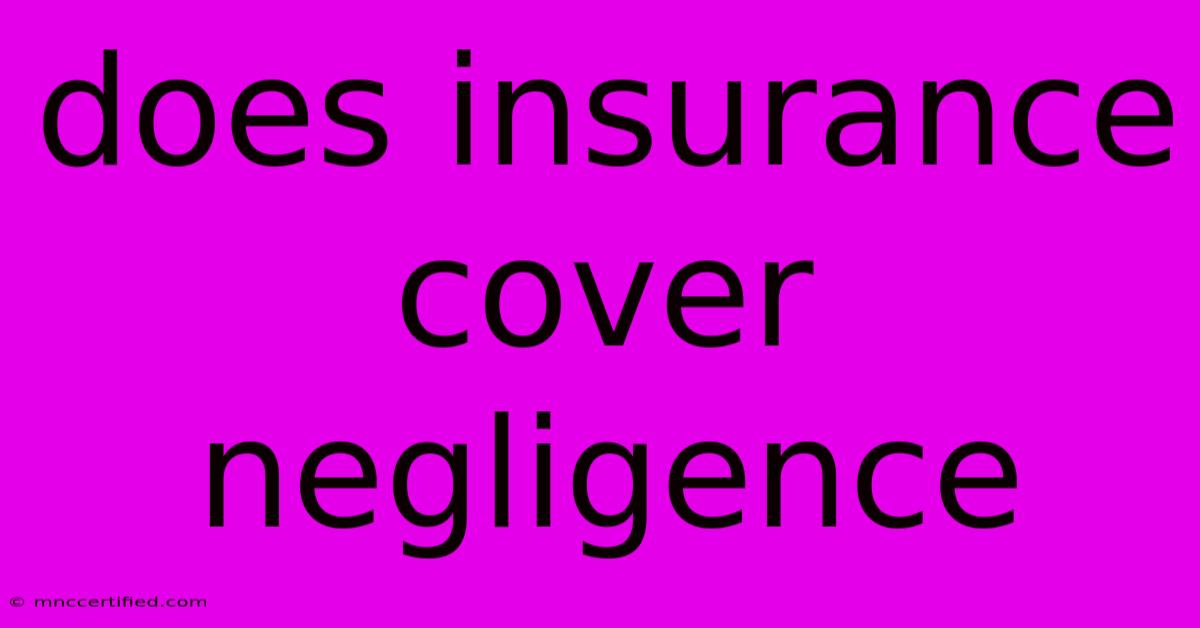Does Insurance Cover Negligence

Table of Contents
Does Insurance Cover Negligence? A Comprehensive Guide
Negligence, a common term in legal discussions, refers to a failure to exercise the standard of care that a reasonable person would exercise in a similar situation. This failure results in harm or injury to another person. But does insurance cover negligence? The answer, unfortunately, isn't a simple yes or no. It depends on several crucial factors. This article will delve into the complexities of insurance coverage and negligence, helping you understand when you might be covered and when you might not.
Types of Insurance and Negligence Coverage
Different types of insurance policies address negligence in various ways:
1. Liability Insurance: Your Primary Shield Against Negligence Claims
This is the most relevant type of insurance when it comes to negligence. Liability insurance, whether it's homeowners insurance, auto insurance, or professional liability insurance (Errors & Omissions insurance), is designed to protect you financially if you're legally responsible for causing harm to someone else through your negligence.
- Homeowners Insurance: Covers liability claims arising from accidents on your property, such as someone slipping and falling.
- Auto Insurance: Covers liability claims resulting from car accidents you cause due to negligence, such as failing to stop at a red light.
- Professional Liability Insurance (Errors & Omissions): Protects professionals like doctors, lawyers, and accountants from claims of negligence in their professional services. This is crucial as professional negligence can lead to significant financial losses for both the professional and their clients.
Important Note: Liability insurance typically only covers negligent acts. It usually won't cover intentional acts, criminal behavior, or certain excluded activities specified in your policy.
2. Other Relevant Insurance Types
While liability insurance is the most directly relevant, other types of insurance can indirectly address the financial fallout from negligence:
- Umbrella Insurance: Provides extra liability coverage beyond the limits of your primary policies (homeowners, auto, etc.). This is highly recommended as a supplemental layer of protection against substantial claims.
- Commercial General Liability Insurance: For businesses, this insurance covers bodily injury and property damage caused by negligence during business operations.
Factors Affecting Negligence Coverage
Several factors determine whether your insurance will cover a negligence claim:
- Policy Exclusions: Carefully review your policy documents. Many policies exclude coverage for specific acts, such as intentional harm or illegal activities. Understanding these exclusions is crucial.
- The Specifics of the Negligence Claim: The court will determine if negligence actually occurred. The burden of proof rests on the claimant to demonstrate that you acted negligently and that your negligence directly caused their harm.
- Your Cooperation with the Insurance Company: Failing to cooperate with your insurer's investigation can jeopardize your coverage. This includes providing accurate information and attending necessary interviews.
- Policy Limits: Your insurance policy has limits on the amount it will pay out for any single claim or in total during the policy period. If the claim exceeds these limits, you're responsible for the difference.
What Happens if Your Insurance Doesn't Cover Negligence?
If your insurance company denies coverage for a negligence claim, you'll likely face a lawsuit. This can result in significant financial burdens, including legal fees, court costs, and potentially substantial damages awarded to the plaintiff. This highlights the importance of having adequate insurance coverage and understanding your policy's terms and conditions.
Key Takeaways: Protecting Yourself from Negligence Claims
- Review Your Policies Regularly: Understand your coverage limits and exclusions.
- Maintain Adequate Insurance Coverage: Ensure you have sufficient liability coverage to protect yourself from potentially expensive negligence claims.
- Practice Safe Habits: Being mindful of your actions and taking precautions to avoid accidents is the best way to minimize the risk of negligence claims.
- Consult with a Legal Professional: If you're facing a negligence claim, seeking legal advice is essential. An attorney can help you understand your rights and responsibilities.
This information is for general guidance only and does not constitute legal advice. Always consult with a qualified legal professional and your insurance provider for specific advice related to your situation. Understanding the complexities of insurance and negligence is crucial for protecting your personal and financial well-being.

Thank you for visiting our website wich cover about Does Insurance Cover Negligence. We hope the information provided has been useful to you. Feel free to contact us if you have any questions or need further assistance. See you next time and dont miss to bookmark.
Featured Posts
-
Peoples Insurance Marietta Ohio
Nov 26, 2024
-
Exploring Egypt Nile Cruise For Canadians
Nov 26, 2024
-
Newcastle West Ham Premier League Result
Nov 26, 2024
-
Barbara Taylor Bradford 91 Years Old Passed Away
Nov 26, 2024
-
Geldof On Band Aid 1984 Ed Sheeran
Nov 26, 2024